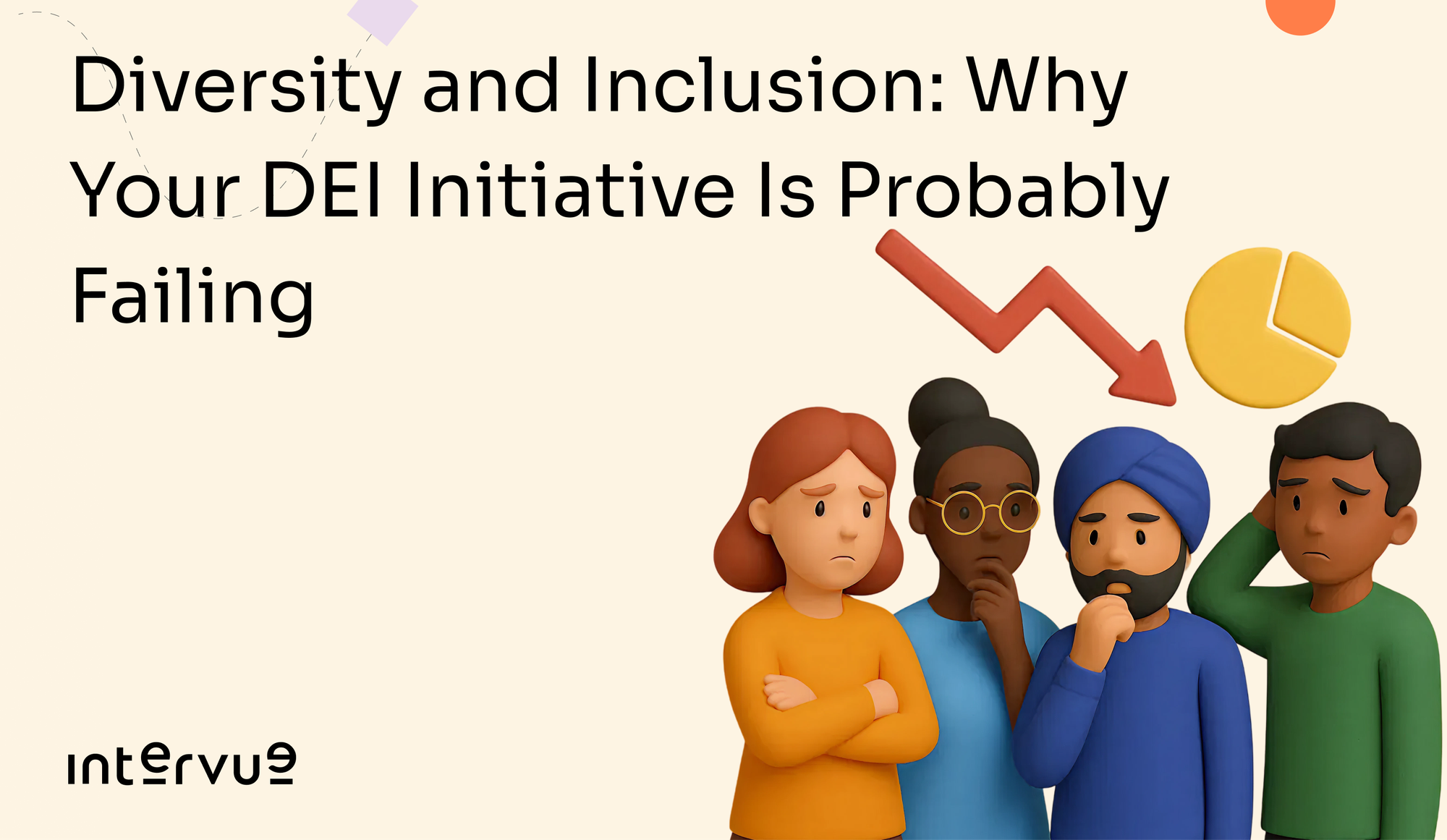Overview
Introduction
What are structured interviews?
Characteristics of structured interviews
What are unstructured interviews?
Characteristics of unstructured interviews
Differences Between structured and unstructured interviews
Similarities Between structured and unstructured interviews
Key statistics and insights
Structured vs. unstructured interviews: Which Should You Choose?
Get started with structured interviews
Final thoughts
FAQs
Your hiring needs to get stronger
Stay updated with our latest blog posts
In hiring, interviews play a major role in assessing candidates' fit, skills, and cultural alignment with a company. However, not all interviews are created equal. Broadly, interviews can be categorized into two types: structured and unstructured. Each approach has its advantages, challenges, and ideal use cases. Understanding these types can help recruiters and hiring managers decide which method best suits their needs.
In this article, we will explore the fundamentals of structured and unstructured interviews, their characteristics, differences, and similarities, and offer insights to help you choose the best approach.
Structured interviews are highly organized and standardized interviews where each candidate is asked the same set of predetermined questions in the same order. This systematic approach ensures consistency, as each candidate's responses are evaluated against identical criteria. Structured interviews often rely on questions focused on job-related skills and experiences, allowing for a fair comparison of candidates' abilities.
Standardized questions: Every candidate answers the same questions, creating a uniform interview experience and allowing easy comparison.
Scoring rubrics: A scoring rubric is typically used to evaluate responses based on predefined criteria, making it easier to measure each candidate’s answers objectively.
Focus on job-related skills: Structured interviews emphasize competencies relevant to the role, such as technical skills, problem-solving abilities, and role-specific experience.
Predictability and consistency: With a structured format, interviewers are less likely to deviate from the questions, which helps reduce biases and ensures a similar experience for all candidates.
Legal and fair: Because of their consistent format, structured interviews are often considered fairer and are less likely to result in legal challenges, especially in high-stakes or highly regulated hiring environments.
Structured interviews are commonly used for roles where specific skills and experiences are essential for success, such as technical positions, customer service, or finance.
Unstructured interviews, on the other hand, are less formal and more flexible. Interviewers can ask different questions based on the conversation’s flow, the candidate's responses, or insights gathered during the interview. This approach allows for a more conversational, dynamic interaction and can help reveal unique insights into the candidate’s personality and cultural fit.
Open-ended and adaptable: Questions often encourage candidates to discuss experiences or qualifications more freely.
Less predictable structure: The format is fluid, and interviewers may shift topics based on the conversation, making each interview a unique experience.
Emphasis on personality and cultural fit: Unstructured interviews are valuable for assessing a candidate’s personality, adaptability, and potential alignment with the company culture.
Higher flexibility for interviewers: Interviewers have more freedom to explore topics spontaneously, which can lead to deeper insights into a candidate’s background or problem-solving approach.
Potential for bias: Without standardized questions or a scoring rubric, unstructured interviews can be more prone to biases, especially if the interviewer is influenced by factors unrelated to job performance.
Unstructured interviews are often preferred for creative or leadership roles, where personality, adaptability, and innovative thinking play a critical role.

Consistency: Structured interviews provide a consistent experience across candidates, while unstructured interviews vary based on each interaction.
Question format: Structured interviews use predetermined questions, while unstructured interviews rely on flexible, open-ended questions.
Evaluation method: Structured interviews typically use a scoring rubric, whereas unstructured interviews rely on subjective assessment.
Focus: Structured interviews emphasize job-specific skills and competencies; unstructured interviews often focus on personality and cultural fit.
Bias: Structured interviews are generally less susceptible to bias, while unstructured interviews require more careful oversight to maintain objectivity.

Despite their differences, both types of interviews share some key similarities:
1) Purpose
Both structured and unstructured interviews aim to assess a candidate’s suitability for a role.
2) Interviewer skills matter
Regardless of format, the effectiveness of an interview depends on the interviewer’s skills, such as the ability to probe responses or ask clarifying questions.
3) Candidate experience
Both types of interviews contribute to the candidate’s experience with the organization, which can impact their perception of the company.
4) Opportunities for follow-up
In both structured and unstructured interviews, interviewers may ask follow-up questions to explore responses in more detail, though this is more common in unstructured settings.
5) Room for improvement
Both formats can benefit from iterative improvements, based on hiring results, to better align with organizational goals.
Structured interviews
Predictive accuracy: Structured interviews are better at predicting a candidate's success, with accuracy levels around 50-60%, which is much higher than unstructured interviews. (Source)
Efficient data collection: The standardized format of structured interviews allows faster data collection and processing, saving up to 30% more time compared to unstructured interviews. (Source)
Reduced bias : Structured interviews can cut down interviewer bias by roughly 25%, promoting fairer hiring decisions. (Source)
Best for large groups: Structured interviews work well with large groups, providing reliable data that’s easy to analyze and interpret. They are commonly used in studies with hundreds or thousands of participants. (Source)
Unstructured interviews
In-depth Insights: Unstructured interviews offer rich, detailed insights but are less reliable for predicting outcomes, with an accuracy of around 30-42.5%.( Source)
More time needed: Unstructured interviews typically require 50% more time for both conducting and analyzing due to the detailed nature of the responses. (Source)
Small group focus: These interviews are usually conducted with smaller groups (often fewer than 30 people) because of the time-intensive nature of each interview. (Source)

Deciding between structured and unstructured interviews depends on factors like the role requirements, the level of standardization desired, and the company’s values and hiring philosophy.
1) If consistency and objectivity are priorities
Choose structured interviews, especially for roles requiring specific skills or in industries where consistency is essential.
2) If cultural fit and adaptability are key
Opt for unstructured interviews for roles that require high levels of creativity or interpersonal skills, like leadership or creative roles.
3) Hybrid approach
Many companies use a hybrid model, combining elements of both structured and unstructured interviews to balance consistency with flexibility.
Structured interviews are ideal for roles requiring specific competencies, while unstructured interviews are better for roles requiring adaptability and creativity.
To get started with structured interviews, you need the right tool.
Intervue streamlines the process of conducting structured interviews by offering a robust, rubric-based approach that allows interviewers to evaluate candidates consistently and objectively. By standardizing questions and criteria, Intervue enables teams to focus on job-relevant skills and competencies, minimizing biases and ensuring a fair comparison across all candidates.
This approach not only improves the accuracy of hiring decisions but also enhances the candidate experience, as everyone is assessed based on the same criteria, reducing any uncertainty. Intervue’s intuitive platform makes it easy for interviewers to stay aligned with scoring rubrics, which helps maintain quality and uniformity in hiring across the board.

Understanding the nuances of structured and unstructured interviews can help hiring managers tailor their interview approach to the needs of each role. Structured interviews provide a fair, objective process, while unstructured interviews offer a more flexible, personalized experience. Sometimes, a hybrid approach may deliver the best results by balancing consistency and adaptability. By selecting the right approach, companies can make more informed hiring decisions that align with their goals and values.
1. What is the primary difference between structured and unstructured interviews?
Structured interviews use the same questions for all candidates, ensuring consistency, while unstructured interviews are flexible and tailored to each candidate.
2. Are structured interviews more effective than unstructured interviews?
Structured interviews are better for assessing specific skills, while unstructured interviews suit roles emphasizing creativity and cultural fit.
3. Can structured interviews still allow for follow-up questions?
Yes, follow-up questions can clarify responses, but they generally stick closely to the original question set.
4. Are unstructured interviews more prone to bias?
Yes, unstructured interviews can introduce bias, as questions and assessments vary, making evaluations less consistent.
5. How do I decide which interview type to use for a role?
Choose structured for skill-focused roles, unstructured for culture-driven ones, or a hybrid for a balance of both.
Your hiring needs to get stronger
Stay updated with our latest blog posts






